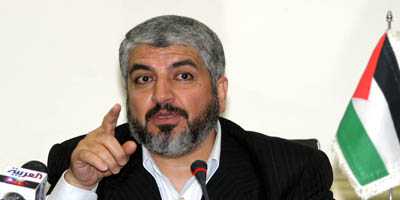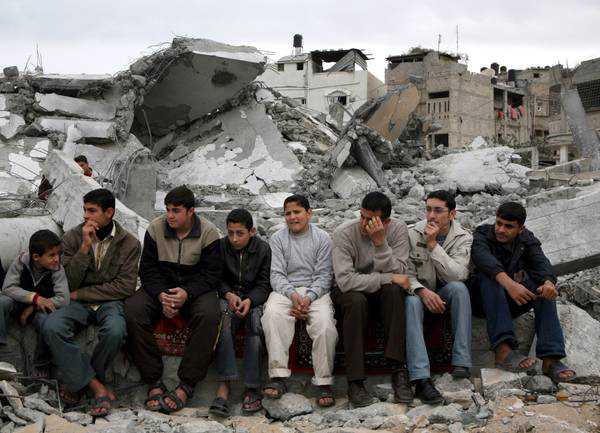What rapper Mic Righteous was actually trying to say was ‘Free Palestine’. But Palestine, it seems, is now a dirty word on the BBC.
Press TV’s Hassan Ghani reports from London:
Palestinian National Authority

What rapper Mic Righteous was actually trying to say was ‘Free Palestine’. But Palestine, it seems, is now a dirty word on the BBC.
Press TV’s Hassan Ghani reports from London:

Ankara dismisses reports suggesting Hamas Politburo Chief Khaled Mashaal will set up movement’s new headquarters in Turkey; further denies pledging $300M in aid funds to Hamas
Elior Levy
Published: 01.30.12, 22:43 / Israel News
Ankara will not allow Khaled Mashaal to relocate Hamas’ Politburo to Turkey, the Turkish website Today’s Zaman reported on Monday.
According to the report, Turkish Deputy Prime Minister Bulent Arınc said that Meshaal’s stay in Turkey was “out of question.”
Related stories:
Report: Mashaal leaves Damascus for good
Hamas officials urge Mashaal to stay on
Op-ed: Hamas in deep trouble
He also denied reports suggesting that Ankara had pledged $300 million in aid funds to Gaza Strip’s rulers.
The Damascus-based Hamas Politburo has decided to relocate following the growing unrest in Syria. It has been looking for another Arab country to host its headquarters, but has so far failed to find one.
Mashaal had recently visited Turkey which, unlike its fellow NATO members, recognizes Hamas as a legal political party. The West considers Hamas a terror organization.
Still, Arınc insisted that the relocation was out of question.
Arınc stressed that Turkey’s ultimate goal was “to realize peace process between Israel and united Palestinian political factions,” adding that Turkey believes that “strengthening the Palestinians unity will benefit the Palestinian people and the peace process.”
Meanwhile, Hamas Prime Minister Ismail Haniyeh left Gaza for a regional tour Monday.
Haniyeh’s tour is expected to include stops in Iran, Qatar, Kuwait and Bahrain.
Haniyeh is travelling with his political adviser Yussef Rizq, his minister of housing and public works Yussef al-Mansi and two key Hamas members – Yehia Sinwar and Rawhi Mushtaha. The latter were released from Israeli prison in 2011 as part of the Shalit deal.
The trip is Haniyeh’s second since his appointment to Hamas PM.
AFP contributed to this report
via Report: Turkey refuses to host Hamas HQ – Israel News, Ynetnews.

By Allen McDuffee
Hamas is developing new relations with Turkey, according to new reports coming from the region. The arrangement includes opening an official Hamas office in Turkey in a matter of weeks and a reported Turkish pledge of $300 million to help re-build Hamas-controlled Gaza.
The new relationship isn’t good for Israeli-Palestinian peace, but it does say some things about regional dynamics, according to Council on Foreign Relations senior fellow Elliott Abrams.
If Hamas is turning to Turkey, Abrams argues, it means that Syria (and Assad) is no longer a host for the organization’s leadership and Iran’s influence is severely weakened.
It’s not clear, however, what Turkey’s requests are. Abrams isn’t convinced that Turkey will put much pressure on Hamas to offer concessions on renouncing terror or curbing anti-Semitism, but if Hamas were to launch another series of attacks against Israel, “the Turks could find that their new alliance is an embarrassment, complicating relations not only with Israel but with the United States and the EU.”
But for Hamas:
This is a smart move for Hamas, of course, at least so long as Turkey’s star is rising and Erdogan is in charge. Far better a Sunni sponsor with growing influence than a Shia paymaster that is an international pariah under growing sanctions. One has to wonder how the Turkish role affects the internal dynamics in Hamas, where the Gaza hierarchy appears to be pushing aside the formerly dominant outsiders, led by Khaled Meshal from Damascus. Is Turkey supporting, indeed financing, this development? Will it push Hamas into elections, now scheduled for May 4th? Will it urge Hamas to join the PLO (well, little urging is needed for that one) and agree to negotiations with Israel?
By Allen McDuffee | 11:52 AM ET, 01/27/2012
via Is Turkey the new home for Hamas? – Think Tanked – The Washington Post.


UN – 2011. The response to the Palestinian bid for recognition of it´s status as a State within the context of the 66th session of the UN General Assembly was, “that a Palestinian Solution only would be possible within a comprehensive solution for the problems in the Middle East “. Since then, the world has witnessed a series of unprecedented NATO aggressions that have brought the world to the brink of a global conflict. The cynical abuse of UNSC Resolution 1973-2011 on Libya to oust the Libyan government, murder the de facto Head of State Muammar Ghadafi, and the installation of several absolutely dependent proxy militia based governments, that have thrown the nation into state of self destruction, facilitated by a NATO that needs the oil, and the territory as possible staging area for a Syrian or Iranian campaign. The relentless covert war on Syria, and the war on Iran which may very well be imminent.(ibid.)
With a Fatah controlled Palestinian Authority that is rightfully accused for selling out on Palestine, and recent negotiations in Amman which were called unforgivable by the PFLP, and strongly criticized by the DFLP and other member organizations of the PLO, Palestinians could ask them selves, how much worse things actually could become.
Keeping in mind, that the sole beneficiaries of what is euphemistically called “The Arab Spring”, which has almost become a Franchise Commodity in style with “The Holocaust” – capital letters – Palestinians are well advised to be on their guards and hold their political leaderships responsible for guaranties, that non, including Fatah and Hamas should develop ambitions to letting Obama´s comprehensive solution be implemented by a NATO / Zionist Arab Spring in Palestine. The signs are strongly indicating that this may be the case.
The recent, more than friendly relations between Hamas and Turkey ought to be carefully scrutinized, and for a number of reasons. One being, that Turkey´s and R. Tayyip Erdogan´s political grand standing with respect to the Israeli act of piracy against a Turkish registered Gaza Flotilla vessel and the Erdogan governments cessation of Turkish Israeli trade, diplomatic and military co-operation only lasted a few weeks. By now, Turkey is back to business as usual, which includes military and intelligence co-operation with Israel. A second would be the strong Turkish – Qatari co-operation in the covert war against Syria. A Syria, which – and I feel sad that I should remind many Palestinians about it – is the sole Arab nation that consequently has been and is supporting Palestine.
When Hamas, short after entering the PLO is blasted by members of the PLO executive committee, for stating it´s solidarity with Syria, while shortly after declaring that Hamas will be sending a delegation to Amman, Jordan, for meetings with the Jordanian government and representatives from Qatar, there arises one simple question, which Hamas ought to answer to the People of Palestine.
Is Hamas planning to play a role in a ” Zionist / NATO organized Arab Spring ? ” It is a question that Palestinians ought to ask Hamas, and one Hamas ought to answer before it is sending a delegation to Amman on Sunday.
The problem is, that it may very well be that Hamas has been duped into an entrapment in glory; just like the PLO and Fatah were before the Oslo Accords. It may very well be that Hamas truly believes that it´s new found friends from Turkey, Jordan, and Qatar have the best of the People of Palestine in mind – but then, can anyone in a leading position at Hamas really be so naive to believe that Obama´s comprehensive solution for the Middle East, which includes the selling out on Syria would mean anything but the possibility that it would be Hamas rather than Fatah that would administrate the Zionist genocide on the People of Palestine ?
The People ought to ask the question, and Hamas ought to answer it before Sunday.
Dr. Christof Lehmann
via Hamas and the Qatar-Turkey Agency of a Palestinian Spring ? | nsnbc.

Senior Fellow, NYU’s Center for Global Affairs
While the representatives of Israel, the Palestinian Authority and the Quartette (the US, EU, Russia and the UN) were recently hosted in Amman, Jordan, in an effort to revive the Israeli-Palestinian peace process, Turkey’s Prime Minister Erdogan met in Ankara with Hamas’ Prime Minister, Ismail Haniya, who openly remains committed to Israel’s destruction and opposes any peace negotiations with Israel. This does not suggest that Mr. Erdogan’s support of Hamas’ position is against Israeli-Palestinian peace, but this raises the question as to whether or not Mr. Erdogan is willing to play a constructive role in mitigating the Israel-Hamas discord or whether he will continue to shore up Hamas’ obstructionist position to the detriment of Israeli-Palestinian peace.
For Turkey to play a leading and constructive regional role, especially in the Israeli-Palestinian peace process, it needs first to regain its credibility with Israel. The prudent thing to do for the Turkish Prime Minister is to openly balance his tenacious demands of Israel to modify its position toward Hamas for example, by putting an end to the blockade in Gaza. Similarly, he should equally demand that Hamas’ leadership change their posture by accepting Israel’s right to exist and renouncing violent resistance as the means by which to achieve a solution to the Israeli-Palestinian conflict.
Erdogan’s open-ended support of Hamas, which is mainly rooted in his Islamic affinity to the organization, as many observers suspect of being the case, places the Turkish Prime Minister in a position to persuade Hamas’ leadership to permanently abandon violence and accept a two-state solution through peaceful negotiations for its own sake. Indeed, however indispensable Hamas may be to a permanent and secure Israeli-Palestinian peace, as Mr. Erdogan clearly and correctly stated, unless Hamas accepts Israel’s reality, Hamas as an organization will eventually be marginalized even by its own followers, the majority of whom want to put an end to the debilitating conflict with Israel that has led nowhere but to more pain and suffering. Repeated polls conducted over the past year have clearly revealed a growing support for the PA while Hamas’ popularity shrinks. Hamas recognizes that it needs to change its strategy towards Israel and that Turkey can play an increasingly important role by helping Hamas’ leadership take the final leap toward peace negotiations with Israel. Such an effort on Turkey’s part is most timely because intense internal deliberations among Hamas’ leaders about the pros and cons of ending militant resistance against Israel are taking place, which also remain points of contention within the unity negotiations between Hamas and the Palestinian Authority.
More than any other party, Turkey has earned the trust and confidence of Hamas by being the first to invite to Ankara Hamas’ political guru, Khalid Mashaal, more than four years ago. Even though Hamas has been designated as a terrorist organization by the US and the EU, Turkey has remained a vocal and ardent supporter of the organization ever since. In fact Ankara has done so even at the expense of undermining its relations with Israel, especially since the Mavi Marmara incident on May 31st, 2010 in which nine activists (eight Turks and one American-Turkish citizen) were killed by Israeli soldiers. It is at this particular juncture that Turkey is perfectly positioned to bring Hamas in-line with the Palestinian Authority due to the fact that: a) Hamas’ political base in Damascus is in tatters due to the upheaval in Syria and is seeking a new political base outside Gaza; b) Iran, Hamas’ main benefactor, is under tremendous international economic and political pressure because of its suspected pursuit of a nuclear weapons program; and c) Egypt’s Muslim brotherhood, Hamas’ political supporter, is marred in a continuing struggle with the military over power-sharing, but gave up violence long ago to get to this point–an object lesson for Hamas.
Notwithstanding the victories of Islamic political parties in the elections held in Tunisia, Morocco, and Egypt (and however encouraging that might be to Hamas), none of these parties have gained national popularity because of their pronounced hatred and animosity toward Israel. They have won because they have focused on domestic issues: their ailing economy, health care, education, and human rights. In fact, precisely because they did not resort to scapegoating Israel or the United States for their respective country’s ailments, a habitual practice of which the Arab youth is weary. Hamas knows its limitations and will not be carried away by the illusion of the ‘Islamic Spring.’ Israel will not be wished away and no party to the Israeli-Arab conflict appreciates that better than Hamas, especially following the 2008/2009 Israeli incursions into Gaza. This further explains why Hamas is seriously deliberating abandoning violence against Israel as a means by which to realize Palestinian statehood.
Mr. Erdogan himself might well think that this is the age of Islamism and further enforce the general perception, in and outside of Turkey, that he favors any organization or country with strong Islamic credentials over others, regardless of the conflicting issues involved. However, Mr. Erdogan is realistic enough to understand that Turkey’s continued economic developments and future leadership role in the Middle East depends on its ability to reconcile between the conflicting parties in the region. In particular, improved relations with Israel are one of the prerequisites to achieve that objective. Should Ankara continue to support Hamas without attempting to moderate its attitude toward Israel, Ankara will not only forsake the opportunity to lead but will be labeled as an obstructionist, especially in the eyes of the Arab-Sunni state that Turkey is trying to court, at a time when the entire region is in the process of geopolitical realignment.
Ankara can be sure that Iran will strongly and continuously encourage Hamas to hold onto his anti-Israel line under the pretext of serving the Palestinians’ cause. In fact, Iran is only looking to serve its regional ambitions and will go to great lengths to protect its national interests, especially by supporting its surrogates such as Hamas and Hezbollah in carrying out its bidding. It is time for Turkey to realize that Tehran’s and Ankara’s national interests do not coincide and that in fact, the two countries may soon be on a collision course not only over post-Bashar Assad’s Syria but over their overall regional ambitions. If Ankara considers regional stability central to its own best national interests, then Turkey must spare no efforts to wean Hamas off of Tehran. Should Turkey decide to act in this direction, it can certainly count on both the US’ and the EU’s support.
Turkey is well positioned to persuade Hamas to renounce violence which is a pre-requisite to becoming an active partner in the peace negotiations and at the same time, is able to provide Hamas’ leadership with the political cover they need to transition from a militant to a non-violent resistance movement. Once the label of being considered a terrorist organization is removed, Turkey may then invite Khalid Mashaal to move his political headquarters from Damascus to Ankara. In so doing, Ankara will not only further distance Hamas from Iran but will help legitimize Hamas in the eyes of the US and the EU. Moreover, Ankara will be in a strong position to assert itself as a significant player in the Israeli-Palestinian peace process while beginning to mend its relations with Israel.
Regional leadership is not a given and it cannot be built on divisions and discords. Turkey must earn the regional leadership role it seeks to play. There is no better time than now for Ankara to use its influence on Hamas to make a crucial contribution to the Israeli-Palestinian peace process while enhancing its leadership role in a region in transformation.


Palestinians in Gaza pray on Friday on rubble of mosque destroyed by Israel [ARCHIVE MATERIAL 20090123 ]
(ANSAmed) – ANKARA – Turkey will help the Palestinians in the Gaza Strip repair the mosques that were damaged in the Israeli attacks and rebuild those that have been destroyed. The announcement was made by the head of the Turkish directorate for religious affairs, Mehmet Gomez, after a meeting with his counterpart from Gaza, Salil Alreqed. The newspaper Hurriyet reports that Alreqed has thanked Turkey for his support against the blockade imposed by Israel. Turkey, a Muslim country, is in a diplomatic crisis with Israel. One of the reasons is Israel’s blockade on Gaza, meant to keep out weapons from Hamas. Turkey sees Hamas as a legitimate organisation, not a terrorist organisation as the U.S. and EU say.
Early last month a request for assistance was issued from Gaza, to restore the damaged (161) and destroyed (34) mosques. The buildings were hit in Israeli air raids in the 2008-2009 period.
The operation, the Turkish agency Anadolu specifies, will cost 15 million USD, more than the Gaza administration can afford.
Turkey has also announced to help with the construction of the largest hospital in the Gaza Strip and a children’s home in Jabalia, which contributes to the already high popularity of Turkish Premier Recep Tayyip Erdogan in Gaza. Erdogan has often said that the inhabitants of Gaza are ”desperate” people, who conduct a ”resistance” against the Israeli ”occupier,” part of Turkey’s strategy aimed at making it a leading country in the area based on historic-cultural and humanitarian relations.
Turkey has played a role in the release of an Israeli hostage by Hamas and in October the country welcomed eleven Palestinian prisoners who had been released in exchange for Israeli soldier Ghilad Shalit.
(ANSAmed).